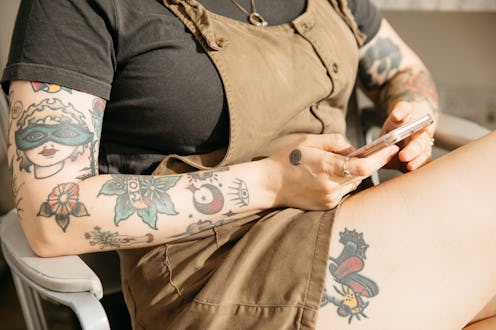
You know the feeling: work is stressful, and so is planning that weekend trip, and remembering to pick up the laundry, and, let’s be honest, friends and relationships can be stressful, too. So you scroll through Facebook, Twitter, Instagram on a loop, on and on. (Maybe Tumblr is just me.) And while scrolling through social media might feel comforting in the moment, a new study suggests that the more stressed people are, the more they use social media in negative ways.
The study, published in Psychiatry Research, focused on around 300 college students and their social media use. The higher the levels of student stress, the more likely they said they were to turn to social media (in this study, that media was Facebook). The study focused on the paradox of receiving different kinds of social support: online support versus offline support. While people often turn to forms of online support when they are stressed “in real life” (IRL), the amount of offline support people receive is actually the part that determines whether they get "addicted" to social media platforms.
The more offline, IRL support people receive, the more likely they are to use social media for fun and for supplementary support. When people don’t have sources of offline support, however, turning to social media for online support threatens to become more of an addiction, the study found.
Perhaps unsurprisingly, then, the more stressed people are IRL, the more likely they are to turn to social media for comfort, which, in turn, can become addicting, which, in turn, can make people more stressed IRL… and on, and on.
While the study clarified this cycle in scientific terms, many people are familiar with the daily experience of social media’s relationship with stress: when people are stressed (think: waiting in line at the grocery store after a long day of work, for example), they are more likely to flip through social media on their phones. The feedback that creates is strong, though: social media can leave people feel emptier and lonelier even when they're not particularly stressed. This chronic emptiness can turn people to social media even when offline IRL forms of support are present and available.
So, where does that leave you, your phone, and your social media platform of choice? For many, social media is the only form of social support available: for example, social media can be a haven for LGBTQ young people to feel safe being out and being themselves. It’s reasonable to assume that stress may disproportionately lead people with various marginalized identities to social media platforms and possible addiction.
If social media can function as a vital protective buffer against real-life scenarios that don't provide necessary support, or can even be dangerous, then how can people recognize when to uninstall that app and maybe only use the desktop version? The study suggests a strong correlation between stress and social media use, so perhaps that’s the place to start: noticing when you’re particularly stressed, and noticing what your instinct is.
When you think about that looming deadline, is your instinct to scroll through Twitter? But what happens when you see that latest news tweet that puts your stomach in even bigger knots than it was in before you started scrolling? And, what happens to the people around you IRL when you disappear into scrollsville?
Perhaps it starts with simply noticing, and maybe writing it down. Where’s your stress level at when you go on social media? Do you go on it when you don’t know what else to do? When you’re bored? Are there people IRL you’re ignoring to go on it? Does that mean you’re coping with those IRL folks? That’s OK: the need to cope by disappearing for a while is A Big Mood.
But maybe you can write down how you feel when your instinct is to reach for social media; how long you’re on it; and how you feel afterwards. Did you actually interact with anyone online, or were you just scrolling? These are the kinds of questions, drawn from Science, that might allow you to start recognizing when social media is helping your social life, and when it’s hurting. Insert meme of your choice here.